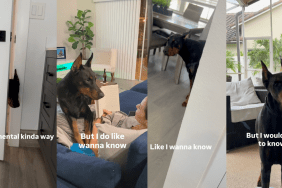The 2012 Westminster Dog Show came to a close yesterday, but the hubbub around the split with longtime sponsor of the show, Pedigree Dog Food, isn’t going away. Westminster announced earlier in the week it would be dropping Pedigree, contending that the images of shelter dogs featured in their ads are too depressing and a turn-off for their audience.
Westminster spokesperson David Frei explained the decision this way:
“Show me an ad with a dog with a smile. Don’t try to shame me. We told [Pedigree] that and they ignored us.”
Must feel terrible to be ignored and forgotten, Mr. Frei. Almost as if you don’t have a voice at all.
He goes on to say: “Our show is a celebration of dogs. We’re not promoting purebreds at the expense of non-purebreds. We celebrate all dogs.”
If by “celebrate all dogs,” you mean “let only purebreds enter the show,” I totally get it.
Frei clarifies: “When we’re seeing puppies behind bars, it takes away from that. Not just because it’s sad, but it’s not our message.”
Dude, yes! Euthanasia isn’t only a big-time buzz kill, it’s soooooo not what we want to think about as we endorse the breeding of more and more dogs in search of the perfect hind quarters and ideal withers while thousands die each day in shelters.
Call me cynical, but I just don’t believe this is an argument over how to talk about dogs. It’s a question of whether we talk about dogs: shelter dogs. And scenes of unwanted innocent animals spliced between images of dogs with hundred dollar haircuts and pristine pedicures — the contrast is stark. It might even make you feel like your priorities are a bit skewed. And no one wants that.
Even more surprising than the WKC’s “Let them eat cake” attitude are its various supporters. Pet columnist for the San Francisco Chronicle Christie Keith points out in her blog “Dogged” that Ad Council researchers found images of suffering animals don’t inspire people to adopt. They do something much more sinister: they inspire people to give money.
I have to admit, I’m not sure what the objection to giving money is. Few shelters I’ve worked with have been over-resourced or cash saturated. The majority need all the financial support they can get — and are fairly savvy about stretching their dollars. If Pedigree wants to give a chunk of change to my local shelter with the goal of making it shiny and inviting, by all means, I’m for it.
That’s not to say every ad needs to be doom and gloom. I love the spots of happy dogs in clean, modern shelters surrounded by enthusiastic volunteers. I know that approach is extremely successful with some audiences — it lets people see that a shelter can be a great, uplifting place to get a dog. But it’s certainly not representative of the scene at most shelters. And that story needs esposure too.
Nor am I saying that dog shows are inherently bad or that we can’t enjoy showing off and admiring beautiful dogs. I peek at the show footage with the same guilty pleasure I do the Miss America contest. It’s fun to ooh and ahh over gorgeous physical specimens. And while contestants of the dog pageants probably come away with less emotional baggage than the beauty contest entrants, I have a hard time seeing much real value in either.
Bottom line, shows like these are entertainment for humans. Dogs couldn’t care less about their measurements falling into some pre-determined range. And when the AKC (of which Westminster is an affiliate) won’t even acknowledge the harm its standards impose, it’s not about love for a breed. It’s about prestige, bragging rights, and genetic engineering.
So, Mr. Frei, I would argue that Pedigree is not shaming you. Heck, the name of the brand is Pedigree. What it is doing is presenting an accurate portrayal of the fate of millions of companion animals. If you experience shame, those feelings originate with you, and the responsible thing to do is evaluate your actions rather than look away and pretend it doesn’t exist.
And if your audience chooses to turn the channel when those images are presented, and continue to support widespread breeding, that choice will not have been made in ignorance.









